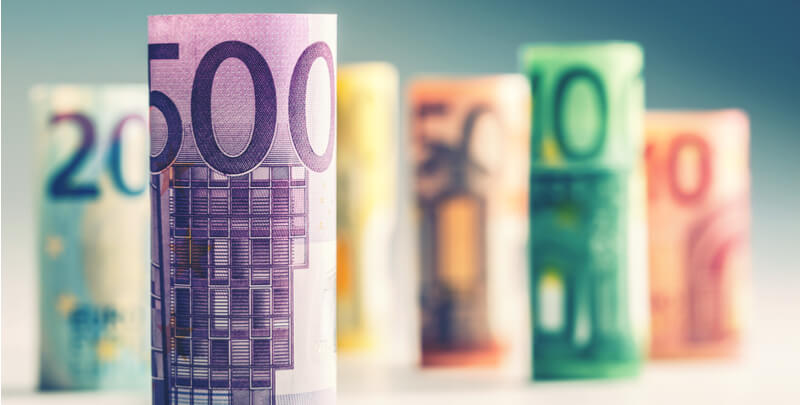ATMs in Latvia: Credit cards and fees
Maybe you’re visiting Latvia for its pristine nature, soaring castles, or beautiful coastline. Or perhaps it’s Riga’s intriguing mix of art nouveau...

With the recent rise in the tourism industry in Latvia, especially its beautiful capital Riga, more and more people are discovering one of Europe’s most beautiful and best kept secrets. Accordingly, the economy is thriving: Latvia was ranked 14th in the world by the World Bank Group’s Ease of Doing Business Network. Offshore banking in Latvia has also seen a significant increase over the last few years, as better interest rates are often available.
The euro is a commonly used currency, but can vary in value along with inflation rates. Latvia is a country with historical landmarks, beaches, and cities. Regardless of where you travel, it’s important to have at least a general understanding of the currency, economy, and the way to manage and spend your money. The following is a guide to the euro in Latvia and the Latvian banking system.
Latvia has been using the euro since January 2014, when it replaced the Latvian lats.
| Characteristics of the euro (EUR) | |
|---|---|
| Names and Nicknames | EUR |
| Symbols & abbreviations | € |
| 1 EUR | One euro is divided into 100 cents |
| EUR coins | Coins are available in denominations of 1, 2, 5, 10, 20, and 50 cents, as well as €1 and €2 |
| EUR banknotes | EUR banknotes are available in units of €5, €10, €20, €50, €100, €200 and €500. |
The euro is the only reliable currency in Latvia. The country changed from the Latvian lat to the euro in 2014, but the lat is no longer accepted as an active currency.
Exchanging money in Latvia is straightforward. It’s very similar to a standard exchange you’d make in any country. Before making any exchange though, it’s good to know the value of your home currency in euros, so make sure to educate yourself about the mid-market rate. Knowing this rate will help you ensure you’re getting the best deal. US and other international travelers can use ATMs associated with their home banks for reduced fees. However, if you do need to use a Latvian ATM, choose to be charged in the local currency (EUR) to avoid poor exchange rates.
It can be difficult to find a trustworthy exchange service to convert your money. The following options are your best choices in terms of security and a fair price:
Though there’s still a fee, the first two options are the most secure and generally don’t offer really poor exchange rates. The others are exchange services whose rate is likely to be more favourable for them than you and will hit you with higher fees per transaction.
Regardless of where you change your money, it’s vital to be fully aware of any and all possible fees. Even if they claim to offer free or low-cost transfers, they’ll often make up for it with a high exchange rate.
All you have to do is a quick online search of your home currency against the euro to find out what your money’s actually worth. There are lots of online currency converters available. The numbers almost always don’t add up: exchange services make their profit by marking up their rates, hoping to fool travelers into believing they need to spend more.
Using an ATM is often one of the cheapest and easiest ways to exchange your currency. Depending on your native currency, you might be better off exchanging your money before arriving. Check with your bank to find out whether they have any partnerships with any branches in Latvia. If your home currency is a major one, such as USD or GBP, you'll likely be fine using a Latvian ATM. Some fees are unavoidable, but always make sure to get your money in euros, rather that your own currency: many ATMs will charge an extra fee for the conversion. In Latvia, there are also many establishments that only accept cash, so make sure you’re always carrying some with you.
If you can, try to avoid exchanging your money at airports, hotels, and other major tourist attractions all together while in Latvia. Many services try to prey upon the lack of knowledge regarding proper exchange rates and the value of the euro.
It isn’t a common problem when using an ATM, but if you're withdrawing money and exchanging cash through a bank or an exchange service in Latvia, make sure to check that your banknotes aren’t damaged. Less reputable, hole-in-the-wall style services may try to give you even slightly damaged bills, which are valueless in some establishments.
Naturally, the best exchange rate you can get comes from withdrawing your funds from an EUR bank account. If you happen to have a friend or relative with an account, consider asking them for assistance. You can transfer money to another person’s account via Wise, which will ensure that you get the exact mid-market rate free - the same one you find on Google - from markups. Have them withdraw the cash, and you’re set. You can also set up a Wise borderless account, through which you can manage your money in multiple global currencies, including euros. Also, by winter 2017, debit cards will be available to borderless account holders which can be used internationally.
Traveller’s cheques aren't commonly used in Latvia. You can take a cheque to a local bank and have it exchanged, but it will come with a fee. Generally, they’re not a good choice for travel in Latvia.
Credit and debit cards are widely accepted throughout Latvia. The most commonly accepted are Visa and Mastercard, though American Express, JCB, Discover, and Diners Club can also be used at some establishments. It’s a good idea to carry cash, as smaller shops, restaurants, and street vendors frequently don't accept credit or debit cards.
Many ATMs will offer the option to change your currency from your home one to euros, and will then charge you an excessive exchange fee. This is called Dynamic Currency Conversion (DCC). It allows the bank to charge any exchange rate they like, regardless of the actual value of your money, and keep the difference. Always opt to make payments, or withdraw money in the local currency, which is by far the better option.
No matter where you travel, it’s essential to let your bank or credit card company know that you'll be using your card outside of your home country. Most banks will automatically freeze your account for suspicious activity, or even cancel the card altogether. If this does happen, getting in touch with your bank when overseas can be a big inconvenience.
There are many ATMs available throughout Latvia’s major cities and tourist centers. You can always use a local ATM (with discretion), but if you’re looking for a specific one, use the following tool:
ATMs offer the best exchange rates available, so try to find the best one for your needs. Remember to always complete your transaction in euros rather than your home currency.
Banking in Latvia is well known for its convenience and positive service experience. Some international banks operate branches in Latvia, though the following banks are the most common in the country.
If your local bank does not have Latvian branches, you may want to use one of these established Latvian banking services:
Founded in 1992, Swedbank has become the most commonly used bank in Latvia over the last couple of decades. The bank operates plenty of branches throughout the country, and serves over 8 million individual clients and over 600,000 corporate account-holders.
The second most popular bank in the country, SEB banka provides bank account services to non-residents of Latvia.
Citadele operates 37 branches throughout Latvia and offers a complete portfolio of banking, financial and private capital management services.
A Norwegian corporation, DNB is amongst the largest banks in the Nordic region. The bank operates in 19 countries, including branches located throughout Latvia.
If you’re looking specifically for international banks, the following are available in Latvia:
Managing your money in a foreign country may seem daunting, but in Latvia, it’s not that difficult. It’s important to always use discretion and trust your judgement: be vigilant to the fact that some services will try to take advantage of your unfamiliarity with the euro. As long as you follow a few simple steps and do a little research, you’ll be able to keep your money safe and have a wonderful time in Latvia!
This publication is provided for general information purposes only and is not intended to cover every aspect of the topics with which it deals. It is not intended to amount to advice on which you should rely. You must obtain professional or specialist advice before taking, or refraining from, any action on the basis of the content in this publication. The information in this publication does not constitute legal, tax or other professional advice from TransferWise Limited or its affiliates. Prior results do not guarantee a similar outcome. We make no representations, warranties or guarantees, whether express or implied, that the content in the publication is accurate, complete or up to date.
*Please see terms of use and product availability for your region or visit Wise fees and pricing for the most up to date pricing and fee information.
This publication is provided for general information purposes and does not constitute legal, tax or other professional advice from Wise Payments Limited or its subsidiaries and its affiliates, and it is not intended as a substitute for obtaining advice from a financial advisor or any other professional.
We make no representations, warranties or guarantees, whether expressed or implied, that the content in the publication is accurate, complete or up to date.

Maybe you’re visiting Latvia for its pristine nature, soaring castles, or beautiful coastline. Or perhaps it’s Riga’s intriguing mix of art nouveau...

Latvia’s capital, Riga, is an eclectic and energetic city. Since holding the title of ‘European Capital of Culture’ in 2014, tourism in Riga has experienced...